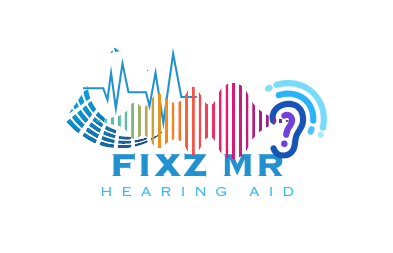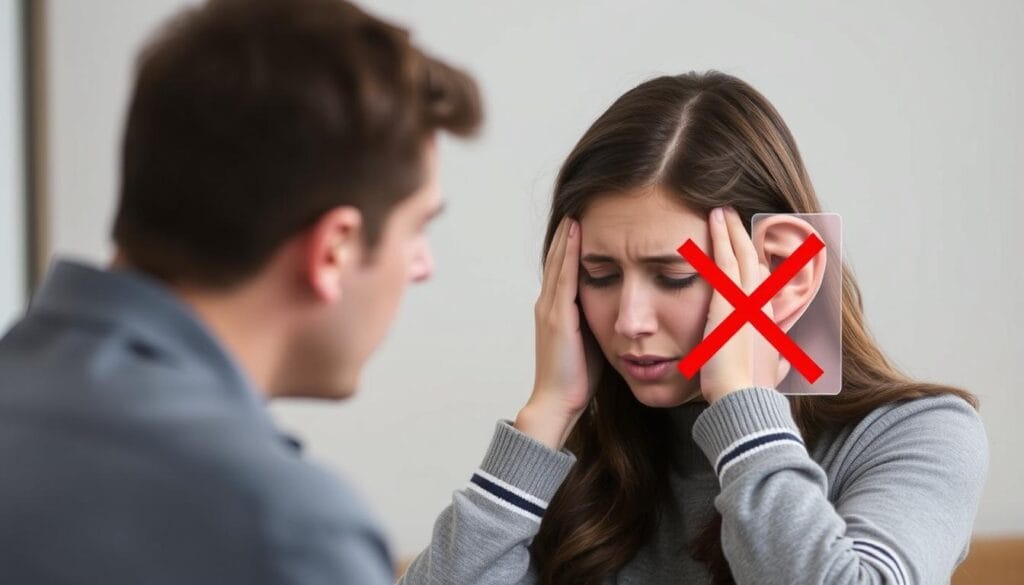Life’s rhythms can change when you face a hearing decrease. It might feel like you’re alone in a world meant for two. But, there’s hope and help for those wanting to improve their hearing. The journey to better hearing starts with understanding and adapting to hearing loss.
Key Takeaways
- Unilateral hearing loss affects spatial awareness and safety, requiring strategies for adaptation.
- Employing hearing aids and assistive devices can dramatically improve the quality of life and reduce hearing strain.
- Understanding the emotional impacts, including anxiety and depression, is vital in the process of overcoming hearing problems.
- Comprehensive communication strategies, such as active listening and speechreading, bolster daily interactions despite a hearing decrease.
- Advancements in technology continue to pave the way for better management and treatment of hearing loss.
- Support networks and counseling play an essential role in fostering resilience and well-being for those affected by hearing impairment.
Understanding Unilateral Hearing Loss
Unilateral hearing loss, or single-sided deafness (SSD), means one ear has a lot less hearing than the other. It happens to about 60,000 people in the U.S. each year. Causes include injuries, loud noises, illnesses, or growths in the brain. It’s important to know how SSD affects people and their communities.
Defining Single-Sided Deafness (SSD)
SSD makes it hard to tell where sounds come from and understand speech in loud places. This makes life harder because the brain has trouble with sound. Cochlear implants and CROS systems help by making sounds clearer and easier to follow.
Implications on Spatial Awareness and Safety
People with SSD have trouble finding where sounds are coming from. This can be dangerous, especially in places where sound helps you move or avoid dangers. For kids, it can make learning and making friends harder, leading to lower grades and more effort to listen.
Challenges in Noisy Environments
Noisy places are tough for those with SSD. The brain needs both ears to understand sounds well, but SSD makes this hard. This leads to more effort to listen and often feeling tired from trying to hear.
Using special hearing aids and understanding SSD can make life better for those affected. Getting help early is important to deal with the problems of unilateral hearing loss.
Lifestyle and Hearing Decrease
Our hearing health is affected by many things, like our lifestyle choices. These choices can make age-related hearing problems worse or help prevent noise damage. Knowing how our daily habits affect our hearing can lead to better hearing health.
Age-Related Auditory Decline
As we get older, hearing loss becomes more common. It’s linked to things like vascular health, chronic illnesses, and lifestyle. A study shows that oxidative stress and inflammation can speed up hearing loss. So, making healthy choices is key.
About 27 million Americans over 50 have hearing loss, but few use hearing aids. Regular exercise, a healthy diet, and quitting smoking can help reduce hearing loss.
Noise-Induced Hearing Loss Across Age Groups
Noise can harm hearing at any age. In the U.S., 24 percent of adults have hearing loss from noise. Places like work and fun spots can have loud sounds over 70 decibels, hurting our hearing.
Wearing earplugs in loud places and limiting loud sounds are important. Using tech like the Starkey hearing aids can also help with hearing problems.
Combining healthy living with modern hearing aids helps people of all ages keep their hearing. By taking these steps, we can improve our lives and lessen hearing loss from age and noise.
Emotional Toll of Hearing Impairment
The emotional struggles of hearing loss are deep and complex. They affect mental health a lot. It starts with feeling frustrated and embarrassed when others don’t speak clearly. This can lead to bigger emotional and cognitive issues.
Link Between Anxiety and Hearing Loss
Over 5% of people worldwide have disabling hearing loss, says the WHO. This can make people anxious because of communication problems. They worry about safety and might misunderstand things. A study found that people with Chronic Suppurative Otitis Media often have anxiety.
Depression and Social Withdrawal
As hearing gets worse, people tend to stay away from social situations. The National Institute on Aging says one in three people aged 65-74 has hearing loss. This can lead to depression. People with deafness are 47% more likely to feel depressed. They might pull back from social life because of the effort to communicate.
Cognitive Impacts and Mental Health Concerns
Hearing loss also affects the mind. Studies show it can make thinking skills worse and even raise the risk of dementia. It can also disrupt sleep, which is bad for mental health. Early treatment is key to dealing with these issues.
| Condition | Impact on Mental Health | Percentage Affected |
|---|---|---|
| Chronic Suppurative Otitis Media | Increased anxiety, stress, depression | Research specific (not provided) |
| Hearing Loss in Elderly | 47% more likely to experience depression | 33-100% in those 65-74 |
| General Hearing Impairment | Cognitive decline, social withdrawal | 5% of global population |
It’s important to understand how hearing loss affects emotions and thinking. This shows how closely linked hearing decrease and mental health are.
Hearing Problems: Symptoms and Self-Recognition
It’s key to spot hearing loss signs early to get the right treatment and keep a good quality of life. Recognizing hearing problems often begins with noticing signs that might seem minor at first. For example, if you struggle to follow conversations or often ask people to repeat themselves, it could mean your hearing is getting worse. Also, needing to turn the volume up on your TV or other devices a lot might be a sign of hearing loss.
Over 30 million adults in the U.S. have some hearing loss, but only about one-third have had their hearing checked. Not getting tested can lead to more hearing problems and make it harder to connect with others and work well. Early detection and using hearing aids can help reduce depression and improve social life.
Many people hesitate to use hearing aids because of the cost and fear of being seen as old. But, with invisible hearing aids, there’s a discreet way to improve hearing without drawing attention. This new technology could make it easier for people to accept and manage hearing issues.
- Only 15% of those who could use hearing aids actually do.
- Traditional hearing aids cost between $800 and $4,000, but cheaper options are available for $200.
- About 1 in 8 U.S. adults has hearing loss, especially those over 70.
Recognizing hearing problems is not just about noticing them. It’s also about understanding the risks and how they affect overall health. For instance, not treating hearing loss can lead to feeling lonely, losing cognitive abilities, and even higher medical bills, costing from $3.3 million to $12.8 million a year in the U.S.
So, spotting hearing loss signs and getting help early is crucial. It’s not just about hearing better. It’s about keeping social connections, staying mentally healthy, and enjoying life more. Catching these signs early can lead to better daily life and long-term health.
Preventive Measures and Auditory Protection
Hearing loss affects millions worldwide, making it crucial to focus on preventive strategies for hearing loss. Protecting our hearing is key to maintaining good auditory health. Let’s look at important tips and steps to keep our hearing strong.
Understanding Risk Factors for Hearing Issues
Many things can lead to hearing loss, from our environment to our choices. For example, loud noises over 85 decibels can harm our hearing and cause tinnitus. Places like movie theaters or sports events, with sounds over 100 decibels, increase these risks a lot.
Mitigating Noise Exposure and Lifestyle Adjustments
Reducing noise exposure is the first step in protecting our hearing. Wearing earplugs in loud places is a simple yet effective way to protect hearing function. Also, keeping the volume on devices below 60% helps prevent hearing damage. Experts recommend yearly hearing tests starting at 60 or earlier for those often exposed to loud noises.
- Limit exposure to loud noises and use protective ear gear in noisy settings.
- Regular hearing screenings to catch early signs of hearing loss.
- Educating young adults on the hazards of unsafe listening practices.
These simple steps can help keep our auditory health in check and may prevent the need for more serious hearing care later.
About 15% of adults have some hearing loss, with higher rates in certain ages and areas. By following preventive steps, we can protect our hearing and improve our lives.
Protecting our hearing through prevention not only helps us but also benefits society. Studies show a return of nearly US$16 for every dollar spent on ear and hearing care over a decade. As we approach 2050, with more people facing hearing loss, it’s vital for us to support strong preventive strategies for hearing loss. This ensures a better future for everyone.
Advanced Solutions for Hearing Function Decline
The field of audiology has seen huge leaps in technology. These advanced hearing solutions are changing lives for the better. They make hearing easier and fit smoothly into daily life, boosting overall happiness.
New hearing aid innovations are leading the way. Today’s hearing aids are more than just amplifiers. They have smart tech, connect wirelessly, and can be adjusted with apps for a better hearing experience.
Breakthroughs in Hearing Aid Technology
AI and machine learning have changed the game. Hearing aids now adjust to different places automatically. This means clearer speech in loud places and easier conversations.
Surgical Options and Cochlear Implants
For serious hearing loss, cochlear implant benefits are huge. These implants go around damaged parts of the ear to directly stimulate the hearing nerve. After surgery, many people find it easier to hear speech in quiet places. For more info, talk to a healthcare provider or check out comprehensive care for hearing loss.
Futuristic Approaches and Research in Audiology
Research is always pushing audiology forward. Scientists are looking into gene therapy for hereditary hearing loss. New materials science breakthroughs could lead to better cochlear implants with clearer sound.
The work in audiology is bringing us powerful hearing aid innovations. It shows a deep commitment to improving hearing and life quality. With these advances, the future looks bright for those with hearing loss. This highlights the key role of advanced hearing solutions in health and wellness.
Impacts of Hearing Decrease on Daily Life
The daily challenges of reduced hearing ability means more than just getting used to sounds. It means changing our daily activities.
Hearing loss affects not just how we talk to others but also our learning and work. For example, deaf students are more likely to drop out, with a rate of 44%, compared to 19% for others. This shows we need special support in schools for these students.
| Industry | Years Lost per 1,000 Workers |
|---|---|
| Mining | 3.5 |
| Construction | 3.1 |
| Manufacturing | 2.7 |
Jobs like mining, construction, and manufacturing are especially risky for hearing. These jobs lead to a lot of hearing loss, making it crucial to prevent this. About 13% of workers in the U.S. who are exposed to loud noises suffer hearing loss.
- Legislative Support: Laws like the Americans with Disabilities Act help remove barriers and fight job bias for people with hearing loss.
- Cultural Identity: Many in the deaf community prefer American Sign Language and feel connected to Deaf Culture. This shows the variety of experiences and ways people adapt.
- Adaptation Initiatives: Managing hearing loss well is key. People and groups use many ways to lessen its effect on daily life.
In conclusion, hearing loss has big effects on our daily lives. We need a wide approach to help, including laws, education, and work changes. By tackling these issues, we can improve life for those with hearing loss.
Exploring Treatments for Reduced Hearing Ability
Finding the right hearing decrease treatments is key to better hearing health. Many find dealing with managing hearing loss symptoms tough. But, with the right info and tools, it’s easier. New medical and tech advances offer many options, from tinnitus therapies to complex surgeries.
There’s good news in the fight against hearing loss. Thanks to research, over-the-counter hearing aids are now easier to get. This helps people with mild to moderate hearing loss get aids fast. It supports early action that can boost communication skills and life quality.
Medication and Therapies for Managing Symptoms
There are also medicines that help lessen hearing loss symptoms, like tinnitus. Researchers are looking into new treatments to stop or reverse sensorineural damage, a common cause of hearing loss.
Therapy is also key in looking after hearing health. From sound therapy to behavioral therapy, people can tackle both physical and mental challenges of hearing loss.
The Use of Masking Devices and Behavioral Therapy
Masking devices are a big help for tinnitus. They play calming sounds to mask the constant tinnitus noise. With counseling and therapy, these methods create a full treatment plan. They help people get used to the sounds and improve their daily life.
Studies also show how hearing treatments affect more than just hearing. Things like cochlear implants don’t just help with hearing. They also protect against dementia and keep the mind sharp.
New hearing decrease treatments show how innovation can change lives. They highlight the need for quick and effective care. With each new breakthrough, managing hearing loss is less of a challenge. It’s more about getting back the sound and joy of life.
Living with a Decrease in Hearing: Adaptation and Resilience
Life changes when hearing gets worse. It’s crucial to be resilient. People are adapting and finding support to help them. It’s not just about hearing loss; it’s also about keeping your mind and heart healthy.
About 30% of people with hearing loss also have tinnitus. Many feel anxious, as shown in a review. This shows we need to adapt and have support from others.
Communication Strategies and Community Engagement
Improving how we communicate is key. This includes speechreading and finding places that make talking easier. Many feel more anxious because of tinnitus.
A supportive society helps a lot. It makes communication clearer for everyone. This helps people with hearing loss feel better and makes the community more caring.
Self-Care Practices for Better Hearing Health
Self-care is important for those with hearing loss. It helps deal with loneliness and stress. This can make life easier and reduce feelings of tiredness and sadness.
Self-care can also make you feel less depressed and more resilient. It helps with physical health too. This shows how important self-care is for coping with hearing loss.









